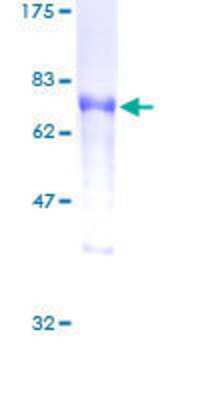DOK2: Proteins and Enzymes
Docking proteins interact with receptor tyrosine kinases and mediate particular biological responses using signal transduction. DOK2 acts as a multiple docking protein downstream of receptor or non-receptor tyrosine kinases. By this mechanism it acts to negatively regulate signal transduction and cell proliferation controlled by cytokines in a feedback loop. DOK2 is highly expressed in cells and tissues of hematopoietic origin as well as in lung. Expression of bcr/abl induces additional tyrosine phosphorylation of the DOK1 and DOK2 proteins and their association with Ras-GAP. Thus, it is suspected that DOK association regulates GAP activity toward Ras and that the DOK proteins serve as mediators of bcr-abl signaling. The role of DOK proteins in bcr-abl regulation may also be implicated in chronic myelogenous leukemia (CML), which is characterized by a Philadelphia chromosome translocation t(9;22). Such a mutation would result in a p210-bcr/abl chimeric protein-tyrosine kinase which has been found in many CML cases.
Show More
1 result for "DOK2 Proteins and Enzymes" in Products
1 result for "DOK2 Proteins and Enzymes" in Products
DOK2: Proteins and Enzymes
Docking proteins interact with receptor tyrosine kinases and mediate particular biological responses using signal transduction. DOK2 acts as a multiple docking protein downstream of receptor or non-receptor tyrosine kinases. By this mechanism it acts to negatively regulate signal transduction and cell proliferation controlled by cytokines in a feedback loop. DOK2 is highly expressed in cells and tissues of hematopoietic origin as well as in lung. Expression of bcr/abl induces additional tyrosine phosphorylation of the DOK1 and DOK2 proteins and their association with Ras-GAP. Thus, it is suspected that DOK association regulates GAP activity toward Ras and that the DOK proteins serve as mediators of bcr-abl signaling. The role of DOK proteins in bcr-abl regulation may also be implicated in chronic myelogenous leukemia (CML), which is characterized by a Philadelphia chromosome translocation t(9;22). Such a mutation would result in a p210-bcr/abl chimeric protein-tyrosine kinase which has been found in many CML cases.
Show More
| Applications: | WB, ELISA, MA, AP |

